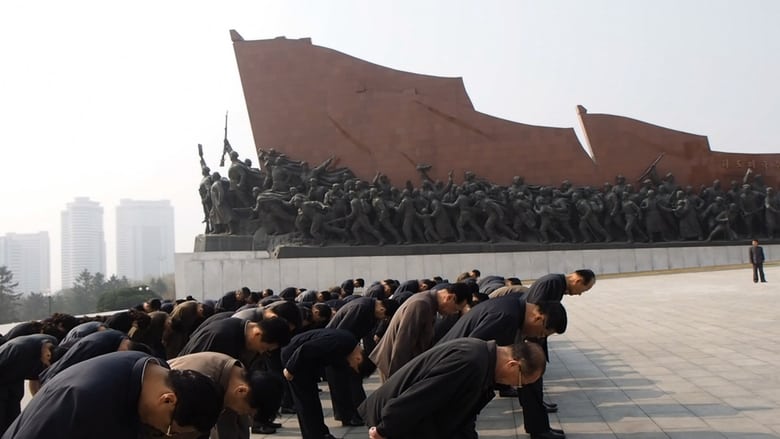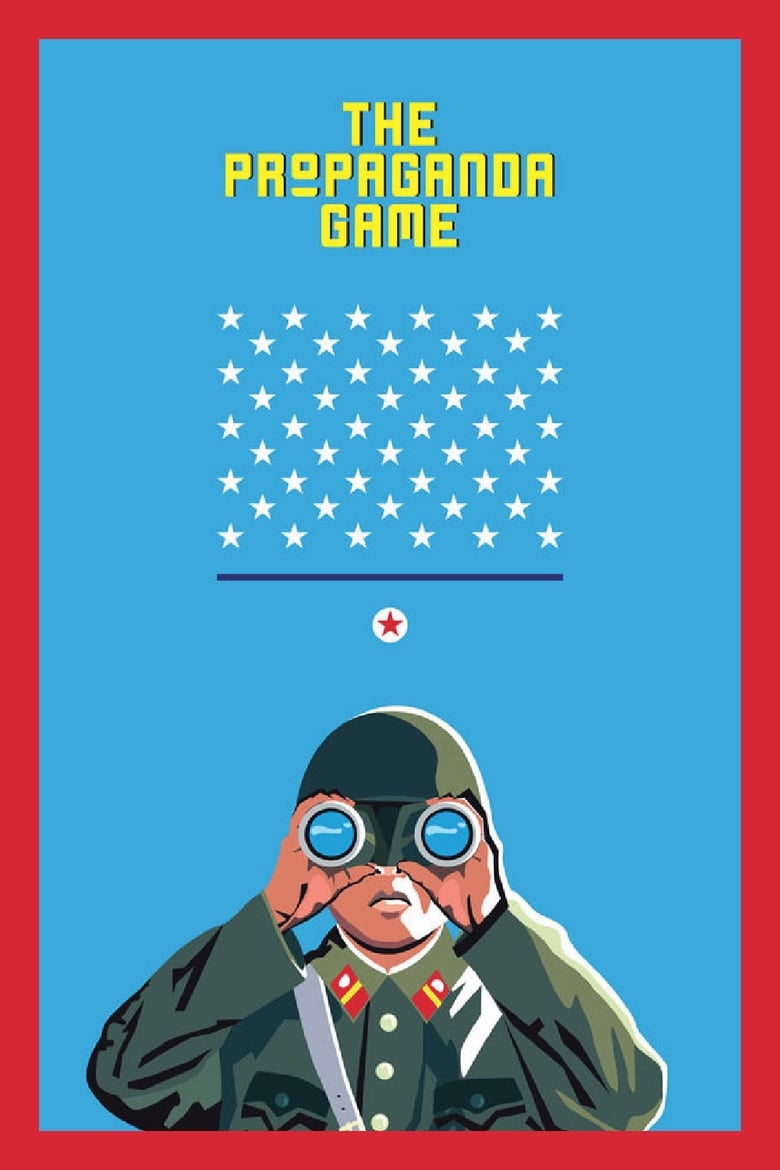Loading


The Propaganda Game
Genres
Documentary
Overview
North Korea. The last communist country in the world. Unknown, hermetic and fascinating. Formerly known as “The Hermit Kingdom” for its attempts to remain isolated, North Korea is one of the largest sources of instability as regards world peace. It also has the most militarized border in the world, and the flow of impartial information, both going in and out, is practically non-existent. As the recent Sony-leaks has shown, it is the perfect setting for a propaganda war.
Details
Budget
$0
Revenue
$0
Runtime
94 min
Release Date
2015-10-03
Status
Released
Original Language
Spanish
Vote Count
146
Vote Average
6.942
Cast
Meet the talented actors who bring the movie to life.
Kim Jong-un
Self (archive footage)
Kim Jong-il
Self (archive footage)
Kim Il-sung
Self (archive footage)
Barack Obama
Self (archive footage)
Harry S. Truman
Self (archive footage)
Alejandro Cao de Benós
Self
Similar Movies
Explore movies similar to this one that you might also enjoy.
6.4
Nazis in the CIA
Florian Hartung and Dirk Pohlmann have reconstructed a previously unknown dimension of the collaboration between Nazis and the CIA in the Cold War. Drawing upon recently released documents, the film exposes for the first time a perfidious, worldwide net that reaches deep into the power structures of the Federal Republic of Germany. Lending their authority to the fact-finders’ mission are high-ranking statesmen, journalists and historians.
2013-10-15 | de
6.5
North Korea: A Day in the Life
If the cityscapes and patriotic anthems of this film seem a far cry from the bleak landscape of Seoul Train, that's no accident. Dutch filmmaker Pieter Fleury, with the full permission and cooperation of the North Korean government, created this propaganda film that gives us a glimpse of a day in the life of one of the world's most enigmatic societies. A Day in the Life, largely dictated by the North Korean film bureau, follows a typical North Korean family through their daily duties, largely dedicated to the pride in the North Korean nation of comrades and the glory of General Kim Jong Il. The film is meant to extol the success of modern North Korea. But does it? With straight footage and a total absence of narration, viewers may interpret Fleury's film in a slightly different manner than intended
2004-01-01 | nl
3.0
Kadyrov, The Dictator of Chechnya
The lifestyle, self-styling and political opinions of Chechen dictator Ramsan Kadyrov are examined in this documentary.
2018-05-15 | fr
7.7
The Trap of Kim
The escalation of tensions between Pyongyang and Washington continues, plunging the world into fear of a nuclear war. Update on the geopolitical issues of this conflict.
2018-02-06 | fr
5.8
North Korea's Deadly Dictator
The assassination of Kim Jong-nam occurred on 13 February 2017 when two women attacked him with VX nerve agent, a lethal chemical weapon, at Kuala Lumpur International Airport in Malaysia. Kim was the eldest son of deceased North Korean leader Kim Jong-il and the half-brother of current North Korean leader Kim Jong-un. North Korean diplomats objected to any form of autopsy being conducted on Kim's body, but the autopsy proceeded as the they did not submit a formal protest. Following Malaysia's refusal to release the body immediately, North Korea's ambassador Kang Chol accused Malaysia of collaborating with the country's enemies over the assassination of Kim Jong-nam.
2017-09-29 | en
0.0
Ryeohaeng
A group of women climbs a summer mountain situated in South Korea. They are refugees who have settled into South Korean society after fleeing from North Korea. For them, climbing the mountains has been an unavoidable journey for survival - a matter of life and death.
2019-08-08 | ko
0.0
Homes Apart: Korea
They speak the same language, share a similar culture and once belonged to a single nation. When the Korean War ended in 1953, ten million families were torn apart. By the early 90s, as the rest of the world celebrated the end of the Cold War, Koreans remain separated between North and South, fearing the threat of mutual destruction. Beginning with one man's journey to reunite with his sister in North Korea, filmmakers Takagi and Choy reveal the personal, social and political dimensions of one of the last divided nations on earth. The film was also the first US project to get permission to film in both South & North Korea.
1991-01-02 | ko
7.2
Crossing the Line
In 1962, a U.S. soldier sent to guard the peace in South Korea deserted his unit, walked across the most heavily fortified area on earth and defected to the Cold War enemy, the communist state of North Korea. He became a star of the North Korean propaganda machine, but then disappeared from the face of the earth. Now, after 45 years, the story of James Dresnok, the last American defector in North Korea, is being told for the first time. Crossing the Line follows Dresnok as he recalls his childhood, desertion, and life in the DPRK.
2006-10-16 | en
7.0
The Red Princess
Who is Kim Yo-jong? In a context of maximum tensions between North Korea and the United States, Pierre Haski paints an unprecedented portrait of the little sister of Kim Jong-un, whose influence in Pyongyang is growing stronger day by day.
2022-04-04 | fr
7.7
A State of Mind
Two young North Korean gymnasts prepare for an unprecedented competition in this documentary that offers a rare look into the communist society and the daily lives of North Korean families. For more than eight months, film crews follow 13-year-old Pak Hyon Sun and 11-year-old Kim Song Yun and their families as the girls train for the Mass Games, a spectacular nationalist celebration.
2005-08-10 | en
8.8
Nadia Comăneci: The Gymnast and the Dictator
A documentary portrait of legendary Perfect Ten gymnast Nadia Comaneci after becoming an icon in the 1976 Olympics, during her Romanian period, and her challenging years under the dictatorship of Nicolae Ceausescu.
2016-07-24 | fr
10.0
Nas Entranhas de Nicolópolis
2022-10-24 | pt
0.0
Shadow Flowers
Ryun-hee Kim, a North Korean housewife, was forced to come to South Korea and became its citizen against her will. As her seven years of struggle to go back to her family in North Korea continues, the political absurdity hinders her journey back to her loved ones. The life of her family in the North goes on in emptiness, and she fears that she might become someone, like a shadow, who exists only in the fading memory of her family.
2021-10-27 | ko
0.0
An Inconvenient Border: Where China Meets North Korea
Bob Woodruff’s daring 880-mile journey along the China-North Korea border examines the delicate relationship between the two countries and the United States.
2017-09-19 | en
6.8
Assassins
True crime meets global spy thriller in this gripping account of the assassination of Kim Jong-nam, the half brother of the North Korean leader. The film follows the trial of the two female assassins, probing the question: were the women trained killers or innocent pawns of North Korea?
2021-08-12 | en
10.0
Cinema in the Land of Comrade Kim
The love of Kim Jong Il, the former dictator of North Korea, for cinema and his adventures, including the kidnapping of a director.
2024-10-12 | fa
0.0
The Girls
Four lucid grandmothers tell their story forgotten by history: the militancy and resistance of the young women of the leftist youth against the dictatorship of Marcos Pérez Jiménez.
2014-06-27 | es
7.0
General Idi Amin Dada
Filmmaker Barbet Schroeder shows the Ugandan dictator meeting his Cabinet, reviewing his troops, explaining his ideology.
1974-05-29 | fr
5.5
A Postcard from Pyongyang
"A Postcard from Pyongyang" is a journey into a deeply enigmatic and completely isolated country that keeps the world in suspense: North Korea. Friends Gregor Möller, Philip Kist and Anne Lewald visit in 2013 and 2017 and do what is strictly forbidden and for which they might have ended up in a forced labor camp: even though accompanied by state watchers, they secretly film their travels, accompanied by state watchdogs. We get an extraordinary insight into one of the most closed societies in the world and experience the 'beautiful new world' as the state propaganda machinery displays it.
2019-09-26 | de
6.4
Chaplin Today: The Great Dictator
A short documentary about the making of "The Great Dictator."
2003-12-30 | en